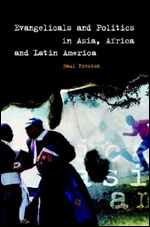 (Reprinted with permission from America, written by Anthony Egan.)
(Reprinted with permission from America, written by Anthony Egan.)
With their eyes so set on heaven, evangelicals either are unconcerned about such “earthly” matters as politics, or their vision of a world rooted in a literal interpretation of the Bible makes them move in right-wing circles. As a result, they are the strategic allies of dictators, multinationals and other sections of third world conservative elites.
Drawing on twenty-seven country studies, sociologist Paul Freston challenges such received wisdom, showing that the truth is far more complex, starting with the term “evangelical” in Evangelicals and Politics in Asia, Africa and Latin America.
A good working definition of the term would stress four features: conversionism (emphasis on the need to change one’s life); activism (particularly missionary efforts); biblicism (the special importance of the Bible, though not necessarily fundamentalist “inerrancy”); and crucicentrism (stressing the centrality of Christ’s sacrifice on the cross). Right-wing fundamentalists may be evangelical, but not all evangelicals are right-wing fundamentalists.
The definition points to the common mistake of distinguishing between established “mainline” Protestant churches and evangelicals. Many “mainline” churches are strongly evangelical.
Evangelicals are prominent (indeed growing) in the Church of England, for example, and in the Anglican Church of Kenya, whose archbishop, David Gitari, is also a prominent critic of the regime of Daniel arap Moi.
Admirably, Freston is modest enough to acknowledge that his subject is vast and that often the best he can do is provide what information there is and suggest areas for further examination.
First, evangelical politics span the spectrum from far left to extreme right. Evangelical conservatism in personal morals and social matters does not automatically translate into endorsement of right-wing parties and dictatorships. A number of churches and pastors heartily endorsed the socialist Sandinista government of Nicaragua from 1979 to 1990, while others were fiercely critical of the regime.
Second, there is often a diversity of political opinions within any evangelical denomination.
An extreme could be found in South Africa during the 1980s, where an activist pastor, Frank Chikane, was tortured in detention by a white deacon of his own Apostolic Church, an institution that had followed apartheid logic to its conclusion and split into three racially defined groups.
There is also a very complex factor involving the distinction between old established evangelical churches and newer denominations, and between their places of origin. Long-established churches, like the Methodists and Presbyterians, have tended to align with certain political movements for a variety of reasons, while newcomers often display less political homogeneity. First established in the 1880s, Korean Protestantism proved a force for modernization and nationalism. It became a bulwark of anti-Communism after World War II and has recently emerged, after the period of military rule, as a force for democratization.
It is also an overstatement, Freston suggests, to link third-world evangelicals with United States-backed right-wing politics.
Another key factor is cultural. In many Latin American countries where Catholicism is either predominant or the established church, evangelicals find themselves adopting a more defensive posture. In others, where anticlericalism was linked to national independence, evangelicals have historically been part of the political establishment.
Because he has opted for a survey approach, Freston draws mainly on published secondary sources. More detailed field research would have strengthened the narrative and analytical content of the book.
My other major question deals with evangelical theology. Though theology is addressed, it needs a far more systematic examination than Freston supplies. To what degree is a particular evangelical church’s political option conditioned by its underlying theology? Conversely, to what extent does a particular political context change evangelical theology?
Freston is careful in his analysis, moderate in his conclusions. He has presented a vast range of empirical and theoretical material in a manner that is valuable to the scholar, yet accessible to the general reader. We are also spared most of the excesses of academese, for which he deserves our thanks.